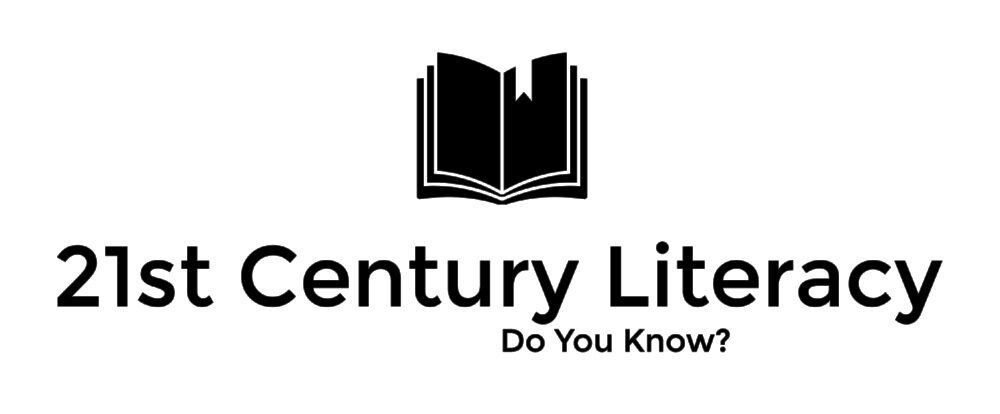An Introduction to 21st Century Literacy
“A Free Web textbook”
Literacy has always meant much more than simply reading and writing.
For most of human history, traditional literacy programs have focused on venerating cultural authorities by reading and replicating sacred literature, which promoted cultural reproduction.
By the late 19th century, with the secularization of education in Western Europe and the United States, literacy programs gradually turned to the reading and venerating of fictional literature, especially novels and short-stories, which promoted introspection and subjective opinions.
Unlike the past, 21st century literacy entails critical thinking and metacognition skills. In order to successfully communicate in school, on the job, in politics, and in life, students now need advanced cognitive and emotional skills. They also need to be able to research and judge reliable information, as well as the ability to read objectively and to write clearly.
Our organization seeks to redefine literacy skills for the 21st century. Human beings need to be able to think critically and to self-monitor their mental processes so they can actively construct, evaluate, debate, and use their knowledge in a global, multicultural world.
We teach the practice of literacy with a focus on science, evidence, and critical thinking. We also teach how to be a successful college student, a short history of literacy and democracy, and an introduction to literature with a focus on understanding human psychology and culture.
We are trying to bring more science to the teaching of writing, more writing to the teaching of science, and more critical thinking to the teaching of reading.
Our materials and workshops are based on highly acclaimed books by Josh M. Beach, including How Do You Know? The Epistemological Foundations of 21st Century Literature (2018), Can We Measure What Matters Most? Why Educational Accountability Metrics Lower Student Learning and Demoralize Teachers (Forthcoming, 2021), and The Myths of Measurement and Meritocracy: Why Accountability Metrics in Higher Education are Unfair and Increase Inequality (Forthcoming, 2021). Beach has been an educator and educational administrator for over 20 years, from kindergarten to the university, across the U.S., South Korea, and China.
21st Century Literacy is more than just reading and writing. It is knowing how to learn and know. Utilizing scientific research on cognition and meta-cognition, students need to understand how the brain creates and uses subjective knowledge, and the different processes that create objective knowledge. Students need to know how concepts work to define and categorize knowledge, and how concepts can be organized into conceptual frameworks that interconnect facts into larger fields of knowledge.
Students need to be able to understand concepts as tools, which can be used to solve real-world problems. Most importantly, students need to recognize threshold concepts, which enable new ways to see and know the world. Two of the most important threshold concepts involve learning to see writing as two separate tools. First, writing is a tool for thinking and knowing. And second, it is a tool for communicating knowledge and persuading people to see the truth.
Students need to understand the theoretical purposes and the concrete practices of research, thinking, and writing. Psychologists call this holistic understanding “meta-cognition,” which means "thinking-about-thinking" and "thinking-about-doing." Such higher order thinking enables us to better understand ourselves ( both our strengths and limitations), which then enables us to know better and perform better. Students need to be able to do, not just know.
This free web textbook will utilize these learning tools. Threshold concepts will be explained as concrete writing and thinking practices, and these concepts will be interconnected into the following conceptual frameworks: (1) The history of literacy, (2) how knowledge is created and how different forms of knowledge are used as tools to know, (3) and finally how knowledge is communicated through writing.
These core concepts will be combined into a single concrete process, which is set within a specific social context. This book is about constructing and debating knowledge in 21st Century multicultural societies. This focus on process, rather than products, is based on the concept of social interaction through language as the fundamental basis for learning and knowledge creation.
And as the specific social context of multiculturalism implies, 21st century literacy must also include political literacy. Students need background knowledge and training to become engaged citizens capable of fostering the public good. This important form of literacy will not be fully covered by this book, but the links between literacy, public schooling, democracy, and political freedom will be introduced and explained, especially in the first part of the book focused on the history of literacy.
21st century literacy is a collection of many higher order skills. Students need to be able to critically evaluate the reliability of diverse sources of knowledge in order to construct knowledge with scientific methods. It also entails openly arguing with diverse groups of people in order to explain and prove the truth.
But we cannot forget that these 21st century skills are built on the foundation of traditional literacy: reading, writing, and basic mathematics. Knowledge is the essential first step to good communication and effective action.
Truth has to be actively constructed by critical thinkers through meticulous and rigorous scientific methods. And this truth needs to be effectively communicated to diverse audiences through arguments in order to direct collective action to solve real-world problems.

